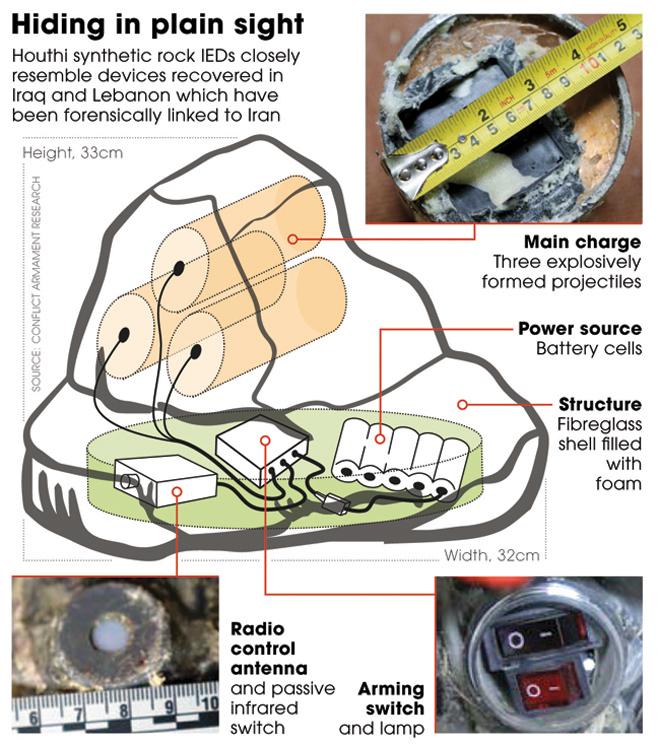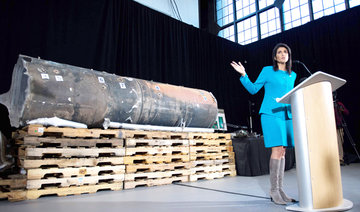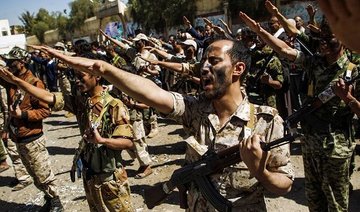LONDON: Sophisticated improvised explosive devices camouflaged as rocks are Iran’s latest contribution to Houthi forces in Yemen, according to a report by a weapons-tracking group.
Based on six missions to Yemen over the last year, and comparisons with similar devices documented elsewhere in the Middle East, Conflict Armament Research (CAR) said the radio-controlled bombs were evidence of a “recent influx of technology.”
“Improvised weapons used by Yemen’s Houthi forces have been manufactured using the same, identically configured components as those recovered from Iranian-backed groups in Bahrain,” said James Bevan, executive director of the group. “CAR’s latest findings confirm consistencies in Iran’s military support, not only to Houthi forces but also to its proxies across the wider region.”
The Saudi-led coalition intervened in Yemen in 2015 against Iran-aligned Houthis after they seized control of the capital and other provinces, forcing the government to flee. The civil war has killed an estimated 10,000 people and displaced more than 2 million people.
CAR, based in the UK, said most IEDs found in Yemen were rudimentary in design but there was an increase in more sophisticated devices. Its report presented comparative findings on explosively formed projectiles (EFPs) documented by CAR in Yemen and similar devices documented by field investigation teams elsewhere in the Middle East.
The IEDs recovered in Yemen featured EFPs, which were camouflaged to resemble natural rocks. These devices were armed by radio control and initiated using passive infrared switches, so they could be classed as RCIEDs.
CAR also found that the EFPs concealed in synthetic rocks resembled in design and construction other devices recovered in Iraq and Lebanon and which had been forensically linked to Iran.
“Multiple strands of evidence suggest that Iran orchestrated the transfer of technology and materiel to Houthi forces in Yemen to assist in the manufacture of RCIEDs,” the report, published today, said.
CAR said material it seized in Yemen was identical to components previously taken from the Jihan 1, an Iranian ship laden with arms and seized by Yemeni authorities in 2013. US and Yemeni officials said it carried a large cache of weapons, including surface-to-air missiles being smuggled from Iran to insurgents in Yemen.
“This confirms widespread assertions that the vessel was destined for Houthi forces in Yemen and would suggest that Iranian support to Houthi forces began as early as January 2013,” the report said.
CAR also pointed to large-scale production, saying that “identical construction, and the use of hand-annotated, serialized components, suggest that the electronics kits used in the Yemen RCIEDs were constructed in bulk and potentially in the same workshop.”
Tim Michetti, CAR’s head of regional operations for the Gulf, said the presence of these EFPs should not be a surprise given they had been found in other conflict areas. “The underlying thread connecting them is Hezbollah or other Iranian proxy groups,” he said.
The supply of weapons from Iran to Yemen has escalated tensions between Arab countries and Tehran.
Saudi Arabia and the US accuse Iran of exporting ballistic missiles to the Houthis, which are then fired at the Kingdom. In December, the US presented fragments from missiles fired at Riyadh’s King Khalid International Airport in November, which it says came from Iran in violation of UN resolutions.
Previous research by CAR has provided evidence of shipments of weapons on dhows from Iran to the Houthi militias.
Report: Iran supplies sophisticated IEDs to Houthi militias
Report: Iran supplies sophisticated IEDs to Houthi militias

Egypt, Qatar mediate for Gaza Strip humanitarian relief

DUBAI: Egypt and Qatar issued a joint statement on Wednesday affirming their ongoing mediation efforts to address a humanitarian crisis in the Gaza Strip.
Egypt and Qatar said their efforts are closely coordinated with the United States to reach an agreement that ensures civilian protection and resolves the humanitarian tragedy.
What recent arrests and ban mean for political influence of Jordan’s Muslim Brotherhood

- Moves seen as response to immediate security threats with organization’s legacy of activism under fresh scrutiny
- Analysts say decision to outlaw the Brotherhood marks a turning point in reform, security and political identity
DUBAI: Jordan’s recent ban on the Muslim Brotherhood marks a historic rupture in the kingdom’s political landscape, ending decades of uneasy coexistence and raising urgent questions about the future of political Islam in the country.
The Brotherhood is now outlawed after authorities uncovered arms caches and arrested last month 16 people for allegedly plotting rocket and drone attacks that authorities said “aimed at targeting national security, sowing chaos and sabotaging within Jordan.”
Interior Minister Mazin Al-Farrayeh’s subsequent decision to declare membership of the organization and promotion of its ideology as illegal reinforced a 2020 court ruling that had been largely unenforced in what analysts described as a “strategy of containment.”
Jordan’s announcement comes at a time of heightened regional tension and surging Islamist activism amid Israel’s war on Gaza. The question on many political observers’ lips since the arrests has been: Why was Jordan targeted by Islamists, and how will the kingdom respond in the coming days?
The Brotherhood’s resurgence in the political spotlight coincided with the eruption of the war on Gaza, as it staged nationwide pro-Palestinian demonstrations.

Hazem Salem Al-Damour, director-general of the Strategiecs think tank, said the group sought to exploit strong anti-Israel sentiment and deep-rooted grassroots support to rally backing for Hamas, the Palestinian militant group founded as a Brotherhood offshoot.
Pro-Hamas slogans at protests highlighted the group’s transnational and pan-Islamic loyalties, often at odds with Jordan’s national interests, especially since Hamas’ offices were shut down in Jordan in 1999.
Authorities were further alarmed when investigations revealed that the busted Brotherhood cell had ties to Hamas’ Lebanese wing, which trained and funded some of the arrested militants. This followed a similar incident in May 2024, when Jordan accused the Brotherhood of involvement in a foiled plot by Iranian-backed militias in Syria to smuggle weapons through Jordan.
At the time, the Brotherhood said that while some members may have acted independently, the organization itself was not involved and remained part of the loyal opposition. It also claimed that the weapons were not intended for use in or against Jordan, but were being transported to support Palestinians in Gaza in their fight against Israeli security forces.
However, Jordan has also witnessed a surge in attempts to smuggle weapons and explosives from Syria for delivery to the West Bank over the past year.
“In a sense, the government, with its ban on the Brotherhood, shut down the group’s external support networks, through which it had sought to exploit Jordan’s geographic position in the region,” Al-Damour told Arab News, referring to the April 23 ban.
According to Al-Damour, the government’s decision was driven by security concerns rather than political calculations, and that the Brotherhood’s dual approach — public activity paired with covert operations — had become unacceptable to the state.
On April 30, four of the 16 defendants were sentenced by Jordan’s state security court to 20 years in prison after being convicted of “possession of explosives, weapons and ammunition.”
Mohammed Abu Rumman, a former Jordanian minister of culture and youth, regards the perceived radicalization of the Brotherhood’s activities as unprecedented.
“The production of weapons, explosives and missiles, as well as planning of drone operations marked a significant shift in the mindset of young members of the movement, signaling a clear break from the organization’s traditional framework and presenting a new challenge for the state,” he told Arab News.
The Jordanian Muslim Brotherhood’s cross-border, partisan character dates back to its founding. Inspired by the Egyptian organization established by Hassan Al-Banna in 1928, the Jordanian branch began as a charitable entity and gradually expanded its reach, becoming deeply embedded in the country’s social and political landscape.

For more than four decades, the Brotherhood maintained a close alliance with the early Hashemite regime, backing the late King Hussein during pivotal moments, including the attempted military coup of 1957.
The absence of competing political forces — such as leftist and nationalist parties — due to martial law created a vacuum. This allowed the Islamist movement to broaden its religious-ideological outreach and deepen its political engagement across Jordanian society, including among labor unions and student groups.
The Brotherhood’s political trajectory shifted significantly following the government’s liberalization process in the wake of the April 1989 protests in southern Jordan.
With the lifting of martial law and the resumption of parliamentary elections, the Brotherhood expanded its charitable network by launching its political wing, the Islamic Action Front, in 1992. It quickly seized the moment, winning a strong bloc in the 11th parliament and earning broad popular support, establishing itself as a major political force.
Although the Brotherhood and its political wing retained distinct leaderships and organizational structures, the line between the two remained blurred.
Tensions between the movement and the government first emerged over the 1994 peace treaty with Israel and deepened in 1997, when the IAF chose to boycott the parliamentary elections.
By 2007, the Brotherhood viewed the regime’s policies as increasingly restrictive, particularly changes to the electoral law. The group participated in that year’s elections only symbolically, winning just six seats — a disappointing result that triggered a leadership crisis within the organization.
The 2011 “Arab Spring” revolts marked another period of tense relations in Jordan between the organization and the state, as the ascent of Islamist regimes to power in Egypt and Tunisia sparked alarm in the kingdom.
In 2015, Jordan passed a law dissolving the Brotherhood and transferring its assets to a newly established entity, the “Muslim Brotherhood Association,” in a move widely seen as an attempt to split the more hardline “hawks” from the moderate “doves.”
This new group was formed by leaders who had either been expelled from the original organization or resigned amid an increasingly bitter internal power struggle.

Abu Rumman, the former minister, says that Jordan’s decision to reinforce the 2020 court ruling aims to regulate political activity and ensure transparent participation, potentially benefiting the Brotherhood by pushing it away from the dualities that previously defined Islamist politics and caused internal divisions.
“The strict application of the rule of law requires the Brotherhood to clearly define its identity and role within the national framework, while cutting all foreign ties that raise ambiguity and suspicion,” he said.
The future now hinges on the findings of ongoing security investigations and the extent of the IAF’s links to the Brotherhood’s suspected activities. Soon after the activities of the Brotherhood were outlawed on April 23, Jordanian security forces raided the premises associated with it, acting in line with the new directive. The IAF has not been officially banned, though the authorities also carried out raids on its offices.
Al-Damour, from the think tank Strategiecs, outlined three possible scenarios: the ban remains limited to the Brotherhood, it extends to the IAF if its involvement is proven, or both are fully dismantled.
Under the Political Parties Law, the IAF could face a ban if its involvement in the plot is confirmed, a possibility that has grown after it suspended the membership of three accused members. This would mark a fundamental shift in Jordan’s political landscape and alter the course of reform announced in 2022.
If the IAF survives, Al-Damour said, it would need to formally sever ties with the banned Brotherhood, shrinking its size and influence by cutting off its traditional electoral base, mobilization network, and campaign funding. Alternatively, the party may attempt to circumvent the ban by quietly absorbing sympathizers and non-involved members of the banned group.
“Individuals from the banned group or its affiliated party may establish new licensed political parties, associations, or civil society organizations; and second, they may seek membership in already licensed Islamic parties. Their motivations could vary from genuine political participation and reform to quietly infiltrating these parties,” he said.

However, according to him, a purely legal approach may not be enough to eradicate threats to national security. “This casts doubt on the likelihood that all members of the banned group will comply with the law,” Al-Damour said.
“Instead, the radical elements of the group may intensify covert activity similar to what the group practiced in Egypt during the 1950s and 1960s, and again after the July 30, 2013, revolution, as well as in Syria during the 1980s and Algeria in the 1990s.”
Security and intelligence efforts will likely remain active and focused on tracking the organization’s radical remnants, their networks, and alignment with regional counterparts invested in their continued activity.
Amer Al-Sabaileh, a geopolitical and security expert, stresses the need for a clear state strategy that extends beyond security measures to address social and media aspects. “The organization has enjoyed freedom of operation for years, building extensive support networks,” he told Arab News.
“To contain these implications, the state should construct a strong, solid narrative that clearly communicates the risks associated with the Muslim Brotherhood’s activities within Jordan.”
Jordan’s break from the Muslim Brotherhood, then, is both a response to immediate security threats and a reckoning with the movement’s complex legacy. The question posed at the outset — why was Jordan targeted by Islamists? — finds its answer in the confluence of history, ideology and the shifting sands of Middle Eastern geopolitics.
The kingdom’s next steps may determine not only the fate of political Islam within its borders, but also the broader trajectory of reform, stability and national identity in a region where the lines between domestic dissent and regional conflict are increasingly blurred.

Flights to and from Yemen’s Sanaa airport suspended following Israeli attack, director says

All flights to and from Yemen’s Sanaa International Airport have been suspended until further notice due to extensive damage following Israeli strike, the airport’s general director said on Wednesday in a post on X.
The Israeli military carried out an airstrike on Yemen’s main airport in Sanaa on Tuesday, its second attack in two days on Iran-aligned Houthis after a surge in tensions between the group and Israel.
Gaza rescuers say 31 killed in Israeli strikes on school sheltering displaced

GAZA CITY: Gaza’s civil defense agency said Wednesday that Israeli strikes on a school sheltering displaced people in the war-ravaged Palestinian territory killed 31 people and wounded dozens, with Israel saying it had targeted Hamas militants.
Gaza civil defense media officer Ahmad Radwan told AFP that a total of 31 people were killed and dozens more wounded in Israeli strikes “on a school sheltering displaced persons” in the Bureij refugee camp in the center of the Gaza Strip.
The Israeli military meanwhile said in a statement that its forces had struck a “Hamas command and control center in the central Gaza Strip” which was used “to store weapons.”
The strikes came as Israel drew international condemnation on Tuesday over its plans for an expanded Gaza offensive, as the country’s far-right finance minister called for the Palestinian territory to be “destroyed.”
Nearly all of Gaza’s 2.4 million people have been displaced at least once during the war, sparked by Hamas’s October 7, 2023 attack on Israel.
On Tuesday, Hamas dismissed as pointless ceasefire talks with Israel, accusing it of waging a “hunger war” on Gaza.
Israel’s military resumed its offensive on the Gaza Strip in March, ending a two-month truce that saw a surge in aid into the territory and the release of hostages in exchange for Palestinian prisoners held by Israel.
Gaza aid dries up as Israeli blockade enters a third month

- The current blockade has lasted longer than any previous Israeli halt in aid to Gaza since the Israel-Hamas war began
JERUSALEM: Israel has blockaded all entrances to the Gaza Strip since March.
While pummeling the strip with airstrikes, it has banned any food, water, shelter or medication from being trucked into the Palestinian territory, where the UN says the vast majority of the population is reliant on humanitarian aid to survive. Israel says the blockade aims to pressure Hamas to release the hostages it still holds. Of the 59 captives remaining in Gaza, 21 are believed to still be alive, US President Donald Trump said Tuesday, revealing that three had died.
Here’s a look at the humanitarian crisis spiraling in Gaza, through key statistics and charts:
The current blockade has lasted longer than any previous Israeli halt in aid to Gaza since the Israel-Hamas war began. Hamas attacked Israel on Oct. 7, 2023 and Israel froze aid to Gaza for two weeks.
Now, Gaza is entering its third month without supplies. Thousands of trucks queue along the border of the territory, waiting to be let in. Community kitchens are closing down and bakeries are running out of fuel. Families spend hours waiting in line for small portions of rice.
In their desperation, Palestinians have begun scavenging warehouses and stores for anything left. Aid groups report a rise in looting incidents over the last week. At least some have been looted by armed groups.
Meanwhile, Israel is moving forward with plans to seize all of Gaza and to stay in the Palestinian territory for an unspecified amount of time. It says it will expand operations there, defying calls for an immediate renewal of a ceasefire from families whose relatives are still held hostage in Gaza.
Israel’s offensive has displaced more than 90 percent of Gaza’s population and, Palestinian health officials say, killed more than 52,000 people, many of them women and children. Palestinian officials do not distinguish between combatants and civilians in their count.




















